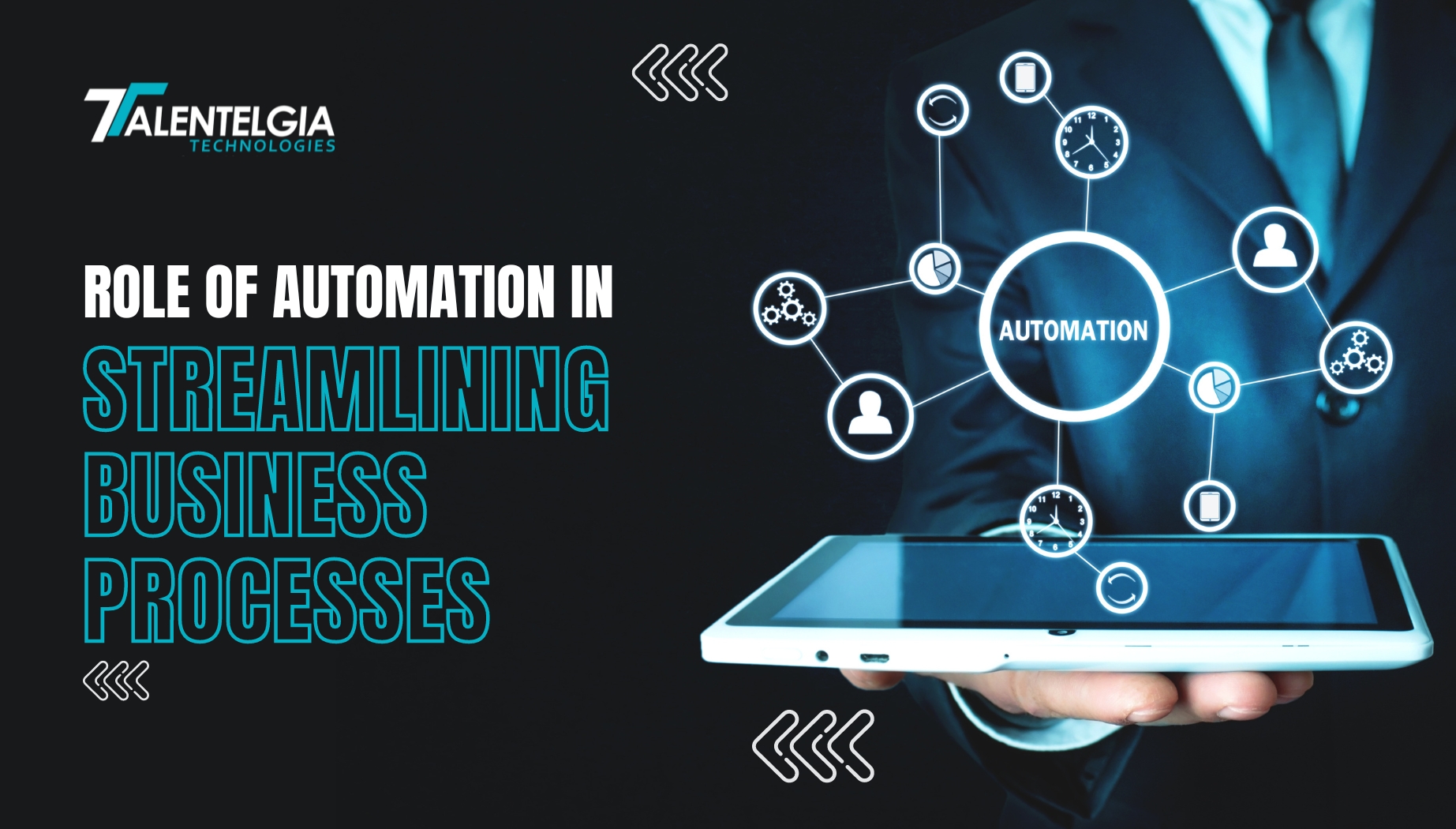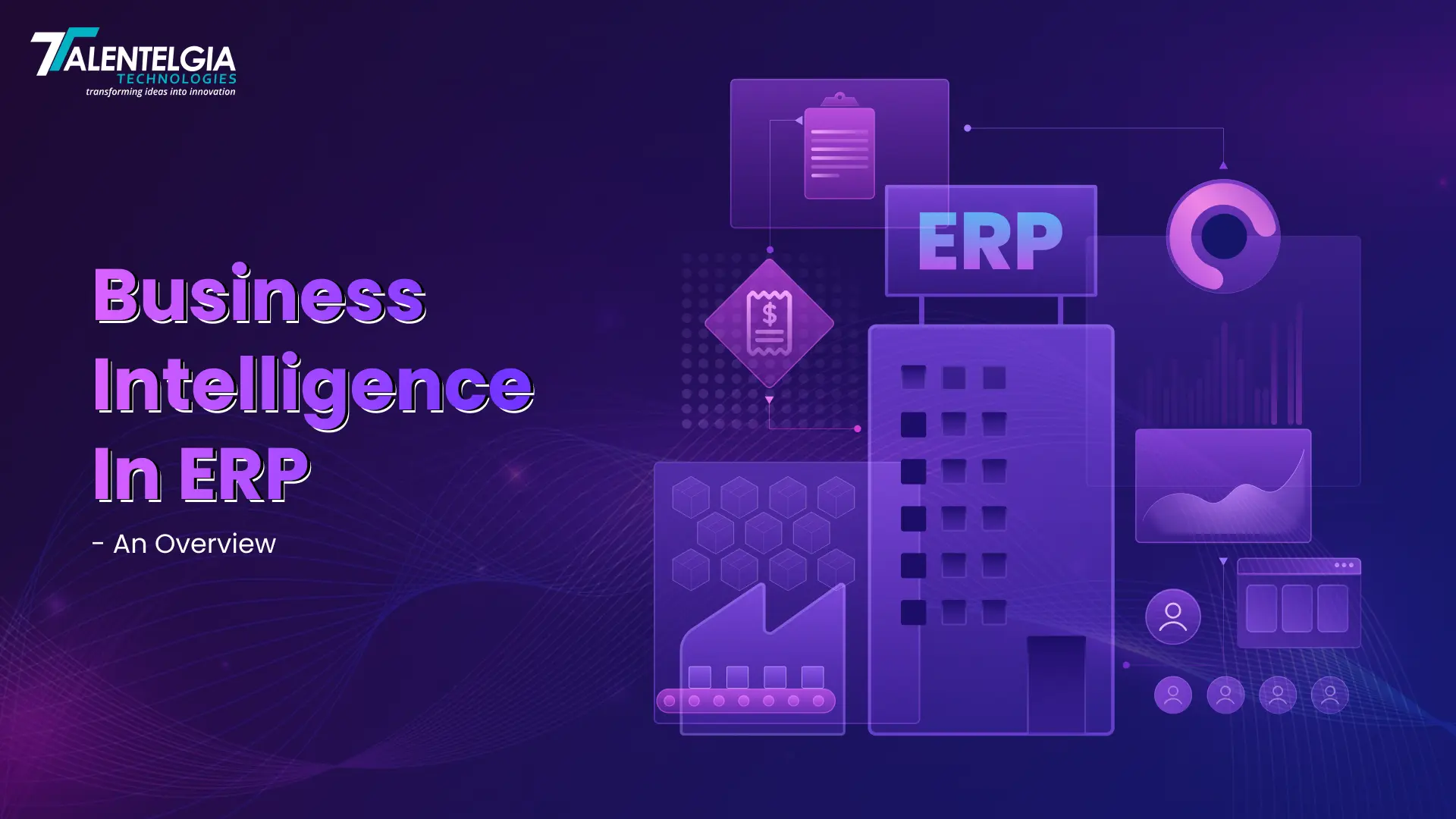67% of companies use business process automation solutions that improve end-to-end visibility across different systems.
Efficiency and agility have become the key factors that determine the success of an organization. One powerful solution that has emerged to tackle these challenges is workflow automation. By leveraging technology to streamline and optimize repetitive tasks and processes, businesses can achieve higher levels of productivity, accuracy, and overall effectiveness. In this blog post, we’ll delve into the fundamentals of workflow automation, define its essence, and explore the numerous benefits it brings to the table.
What is Business Process Automation?
Workflow automation is the strategic use of technology to automate and optimize the sequence of tasks, activities, and processes that make up a business workflow. It involves the creation of a systematic and digitized flow for tasks, ensuring that they are executed consistently and efficiently. Essentially, it’s about letting technology take care of routine and mundane tasks, freeing up human resources to focus on higher-value activities that require creativity, critical thinking, and problem-solving.
Benefits of Implementing Automated Workflows
In a world where time is of the essence, workflow automation emerges as a powerful tool for businesses aiming to stay competitive and agile. By defining and implementing automated workflows, organizations can unlock higher efficiency, greater accuracy, and increased productivity across their operations. Whether streamlining routine administrative tasks or orchestrating complex processes, the benefits of workflow automation are undeniable, contributing to the overall success and sustainability of businesses in today’s dynamic landscape.
Enhanced Efficiency and Productivity: Automated workflows drastically reduce manual intervention and the time-consuming tasks that come with it. This leads to faster completion of processes, freeing up valuable employee time for tasks that require strategic thinking and decision-making.
Minimized Errors and Increased Accuracy: Human errors are inevitable, but with workflow automation, the margin for error is significantly reduced. Automated processes follow predefined rules and guidelines, minimizing the chances of mistakes and ensuring consistent outcomes.
Consistent Compliance: Many industries are subject to strict regulatory requirements and compliance standards. Workflow automation ensures that processes adhere to these regulations consistently, reducing the risk of non-compliance and associated penalties.
Optimized Resource Utilization: Automation allows businesses to allocate resources more effectively. Employees can focus on tasks that require human expertise while routine tasks are handled by automated systems, resulting in better resource allocation.
Faster Turnaround Times: Automated workflows enable faster completion of tasks, which can have a significant impact on overall project timelines and customer satisfaction. Rapid task completion can be a competitive advantage in today’s fast-moving markets.
Improved Collaboration and Communication: Automated workflows often come with built-in communication tools that enhance collaboration among team members. Notifications, updates, and approvals can be streamlined, reducing delays caused by communication gaps.
Data-Driven Insights: Many workflow automation tools provide analytics and reporting features. These insights offer a clear view of how processes are performing, allowing organizations to identify bottlenecks, inefficiencies, and areas for improvement.
Scalability and adaptability: As businesses grow and evolve, their workflows need to adapt as well. Automated workflows can be easily scaled and modified to accommodate changing needs and business growth.
Key Business Areas for Automation
In an era driven by technology, businesses are constantly seeking innovative solutions to enhance productivity and streamline operations. Enter automation, a game-changing tool that revolutionizes how tasks and processes are executed. This blog post will explore two critical aspects: key areas for automation and the art of selecting the right automation tools for your business.
Customer Relationship Management (CRM) Automation
Efficiently managing customer interactions is essential for business growth. CRM automation simplifies customer data collection, lead nurturing, and follow-ups. Automated systems can trigger personalized communication, ensuring customers feel valued and engaged throughout their journey.
Financial and accounting process automation
Numbers are the lifeblood of any organization, and automating financial and accounting processes ensures accuracy and compliance. From invoice generation to expense tracking and payroll management, automation minimizes errors, reduces manual effort, and maintains a clear financial trail.
Appointment Scheduling and Reminder Automation
Dealing with customer appointments can be time-consuming and prone to errors when handled manually. Automation streamlines this process by enabling customers to book appointments online at their convenience, while the system instantly updates schedules and availability. Automated reminders—sent via email, SMS, or app notifications—help reduce no-shows and improve customer satisfaction.
Supply chain and inventory management automation
Managing supply chains and inventories can be complex, but automation optimizes the process. It monitors inventory levels, predicts demand, and triggers orders automatically. This not only prevents stockouts but also reduces excess inventory, saving costs and improving supply chain efficiency.
Appointment Scheduling and Reminder Automation
Dealing with customer appointments can be time-consuming and prone to errors when handled manually. Automation streamlines this process by enabling customers to book appointments online at their convenience, while the system instantly updates schedules and availability. Automated reminders—sent via email, SMS, or app notifications—help reduce no-shows and improve customer satisfaction.
Human Resources and Employee Onboarding Automation
The HR department juggles various tasks, from recruitment to onboarding. Automation eases this burden by managing job postings, applicant tracking, and even employee onboarding processes. This ensures a seamless experience for both candidates and new hires.
Choosing the Right Automation Tools
As businesses strive for operational excellence, automation emerges as a critical enabler. By automating key areas like CRM, financial processes, supply chain management, and HR tasks, organizations can achieve higher efficiency, reduced errors, and enhanced customer satisfaction. However, the journey starts with the right tools. Carefully evaluate your needs and research automation solutions that align with your business goals. Ultimately, successful automation empowers businesses to focus on innovation, strategy, and growth in an increasingly competitive landscape.
Evaluating Your Organization’s Needs
Before embracing automation, understand your business’s unique needs. Identify pain points, bottlenecks, and processes that can benefit from automation. Assess current workflows to determine where automation can have the most significant impact, such as speeding up processes or reducing errors.
Exploring automation software and platforms
Once you’ve pinpointed areas for automation, research and explore the available software and platforms. Look for solutions that align with your industry and business size. Consider factors such as user friendliness, scalability, and integration capabilities. Read reviews, seek recommendations, and even request demos to gain insights into the tools’ functionalities.
Selecting the Right Tool
Choose a tool that not only fits your current needs but also has room to accommodate future growth and changes. Consider cloud-based solutions, as they often provide flexibility and accessibility. Additionally, ensure the tool’s user interface is intuitive, as this can impact user adoption and the overall success of the automation initiative.
Implementation and training
Implementing automation tools requires planning and training. Involve relevant stakeholders and allocate resources for a smooth transition. Offer training sessions to employees to familiarize them with the new tools and ensure they can fully utilize the automation features.
Conclusion
In a world where time is of the essence, workflow automation emerges as a powerful tool for businesses aiming to stay competitive and agile. By defining and implementing automated workflows, organisations can unlock higher efficiency, greater accuracy, and increased productivity across their operations. Whether streamlining routine administrative tasks or orchestrating complex processes, the benefits of workflow automation are undeniable, contributing to the overall success and sustainability of businesses in today’s dynamic landscape.


 Healthcare App Development Services
Healthcare App Development Services
 Real Estate Web Development Services
Real Estate Web Development Services
 E-Commerce App Development Services
E-Commerce App Development Services E-Commerce Web Development Services
E-Commerce Web Development Services Blockchain E-commerce Development Company
Blockchain E-commerce Development Company
 Fintech App Development Services
Fintech App Development Services Fintech Web Development
Fintech Web Development Blockchain Fintech Development Company
Blockchain Fintech Development Company
 E-Learning App Development Services
E-Learning App Development Services
 Restaurant App Development Company
Restaurant App Development Company
 Mobile Game Development Company
Mobile Game Development Company
 Travel App Development Company
Travel App Development Company
 Automotive Web Design
Automotive Web Design
 AI Traffic Management System
AI Traffic Management System
 AI Inventory Management Software
AI Inventory Management Software
 AI Software Development
AI Software Development  AI Development Company
AI Development Company  AI App Development Services
AI App Development Services  ChatGPT integration services
ChatGPT integration services  AI Integration Services
AI Integration Services  Generative AI Development Services
Generative AI Development Services  Natural Language Processing Company
Natural Language Processing Company Machine Learning Development
Machine Learning Development  Machine learning consulting services
Machine learning consulting services  Blockchain Development
Blockchain Development  Blockchain Software Development
Blockchain Software Development  Smart Contract Development Company
Smart Contract Development Company  NFT Marketplace Development Services
NFT Marketplace Development Services  Asset Tokenization Company
Asset Tokenization Company DeFi Wallet Development Company
DeFi Wallet Development Company Mobile App Development
Mobile App Development  IOS App Development
IOS App Development  Android App Development
Android App Development  Cross-Platform App Development
Cross-Platform App Development  Augmented Reality (AR) App Development
Augmented Reality (AR) App Development  Virtual Reality (VR) App Development
Virtual Reality (VR) App Development  Web App Development
Web App Development  SaaS App Development
SaaS App Development Flutter
Flutter  React Native
React Native  Swift (IOS)
Swift (IOS)  Kotlin (Android)
Kotlin (Android)  Mean Stack Development
Mean Stack Development  AngularJS Development
AngularJS Development  MongoDB Development
MongoDB Development  Nodejs Development
Nodejs Development  Database Development
Database Development Ruby on Rails Development
Ruby on Rails Development Expressjs Development
Expressjs Development  Full Stack Development
Full Stack Development  Web Development Services
Web Development Services  Laravel Development
Laravel Development  LAMP Development
LAMP Development  Custom PHP Development
Custom PHP Development  .Net Development
.Net Development  User Experience Design Services
User Experience Design Services  User Interface Design Services
User Interface Design Services  Automated Testing
Automated Testing  Manual Testing
Manual Testing  Digital Marketing Services
Digital Marketing Services 
 Ride-Sharing And Taxi Services
Ride-Sharing And Taxi Services Food Delivery Services
Food Delivery Services Grocery Delivery Services
Grocery Delivery Services Transportation And Logistics
Transportation And Logistics Car Wash App
Car Wash App Home Services App
Home Services App ERP Development Services
ERP Development Services CMS Development Services
CMS Development Services LMS Development
LMS Development CRM Development
CRM Development DevOps Development Services
DevOps Development Services AI Business Solutions
AI Business Solutions AI Cloud Solutions
AI Cloud Solutions AI Chatbot Development
AI Chatbot Development API Development
API Development Blockchain Product Development
Blockchain Product Development Cryptocurrency Wallet Development
Cryptocurrency Wallet Development About Talentelgia
About Talentelgia  Our Team
Our Team  Our Culture
Our Culture 
 Healthcare App Development Services
Healthcare App Development Services Real Estate Web Development Services
Real Estate Web Development Services E-Commerce App Development Services
E-Commerce App Development Services E-Commerce Web Development Services
E-Commerce Web Development Services Blockchain E-commerce
Development Company
Blockchain E-commerce
Development Company Fintech App Development Services
Fintech App Development Services Finance Web Development
Finance Web Development Blockchain Fintech
Development Company
Blockchain Fintech
Development Company E-Learning App Development Services
E-Learning App Development Services Restaurant App Development Company
Restaurant App Development Company Mobile Game Development Company
Mobile Game Development Company Travel App Development Company
Travel App Development Company Automotive Web Design
Automotive Web Design AI Traffic Management System
AI Traffic Management System AI Inventory Management Software
AI Inventory Management Software AI Software Development
AI Software Development AI Development Company
AI Development Company ChatGPT integration services
ChatGPT integration services AI Integration Services
AI Integration Services Machine Learning Development
Machine Learning Development Machine learning consulting services
Machine learning consulting services Blockchain Development
Blockchain Development Blockchain Software Development
Blockchain Software Development Smart contract development company
Smart contract development company NFT marketplace development services
NFT marketplace development services IOS App Development
IOS App Development Android App Development
Android App Development Cross-Platform App Development
Cross-Platform App Development Augmented Reality (AR) App
Development
Augmented Reality (AR) App
Development Virtual Reality (VR) App Development
Virtual Reality (VR) App Development Web App Development
Web App Development Flutter
Flutter React
Native
React
Native Swift
(IOS)
Swift
(IOS) Kotlin (Android)
Kotlin (Android) MEAN Stack Development
MEAN Stack Development AngularJS Development
AngularJS Development MongoDB Development
MongoDB Development Nodejs Development
Nodejs Development Database development services
Database development services Ruby on Rails Development services
Ruby on Rails Development services Expressjs Development
Expressjs Development Full Stack Development
Full Stack Development Web Development Services
Web Development Services Laravel Development
Laravel Development LAMP
Development
LAMP
Development Custom PHP Development
Custom PHP Development User Experience Design Services
User Experience Design Services User Interface Design Services
User Interface Design Services Automated Testing
Automated Testing Manual
Testing
Manual
Testing About Talentelgia
About Talentelgia Our Team
Our Team Our Culture
Our Culture

















 Write us on:
Write us on:  Business queries:
Business queries:  HR:
HR: 





